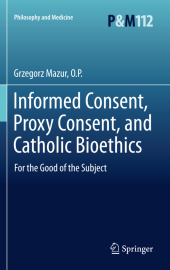 Neuerscheinungen 2013Stand: 2020-01-07 |
Schnellsuche
ISBN/Stichwort/Autor
|
Herderstraße 10
10625 Berlin
Tel.: 030 315 714 16
Fax 030 315 714 14
info@buchspektrum.de |

O.P., Grzegorz Mazur
Informed Consent, Proxy Consent, and Catholic Bioethics
For the Good of the Subject
2012. 2013. xvi, 244 S. 235 mm
Verlag/Jahr: SPRINGER NETHERLANDS; SPRINGER 2013
ISBN: 9400737157 (9400737157)
Neue ISBN: 978-9400737150 (9789400737150)
Preis und Lieferzeit: Bitte klicken
This work is a comprehensive explanation, rooted in Catholic anthropology and moral theory, of the meaning and limits of informed and proxy consent to experimentation on human subjects. It articulates this rationale in therapeutic and non-therapeutic settings.
This work offers a comprehensive understanding rooted in Catholic anthropology and moral theory of the meaning and limits of informed and proxy consent to experimentation on human subjects. In particular, it seeks to articulate the rationale for proxy consent in both therapeutic and nontherapeutic settings. As to the former, the book proposes that the Golden Rule, recognizing the basic inclinations of human nature toward objective goods perfective of human persons, should underpin the notion of proxy consent to experimentation on humans. As to the latter, an additional scrutiny of the amount of risk involved is necessary, since the risk-benefit ratio frequently invoked to justify higher-risk therapeutic research does not exist in its nontherapeutic counterpart. This study discusses a number of possible solutions to this question and develops a position that builds upon the objective notion of the human good.
1. Introduction
2. Chapter 1 : The historical development of the principle of free and informed consent debate on the origin of the principle of free and informed consent in medical and research practices
3. Chapter 2: The articulation of the principle of free and informed consent in human-rights documents
4.Conclusions
5. Chapter 3: The major current interpretations of the principle of free and informed consent
6. Chapter 4: Introduction to the issue of proxy consent
7. Chapter 5: Standards for proxy consent in the therapeutic situation
8. Chapter 6: Critique of proxy consent standards
9. Chapter 7: The golden rule and proxy decision making
10. Chapter 8: Preliminary considerations on proxy consent in the nontherapeutic situation
11.Conclusions
12. Chapter 9: Proxy consent in nontherapeutic settings
13. Chapter 10: Analysis
14. Chapter 1: Resolution of issues related to proxy decision making
15. Conclusions
From the reviews:
"This book presents an in-depth analysis of informed consent and proxy consent ... and offers a robust anthropology and virtue ethic consistent with Roman Catholic teaching to justify and guide these principles. ... The book is researched and written at a high academic level, but it is also very accessible and would be appropriate for philosophers, bioethicists, physicians, researchers, students, and interested readers. ... this book is wonderfully refreshing in its analysis, argumentation, and thesis. ... an important work in both secular and Catholic bioethics." (Gina M. Fullam, Doody´s Review Service, May, 2011)


